Clarity Law
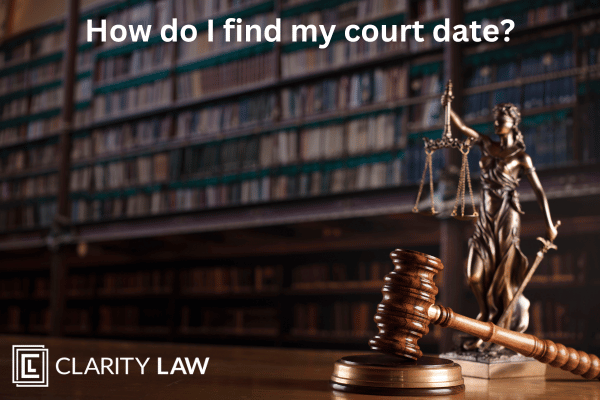
Facing criminal charges can be a stressful and overwhelming experience. One crucial aspect of navigating the legal process is keeping track of your court dates. In Queensland staying informed about when you are required to appear in court for a criminal or traffic matter is essential.
This article will guide you through the steps to check the date of your criminal court appearance in Queensland.
How do I find out my court date?
Bail Documents
If you have been granted bail in court or by the police then the bail document will contain the next court date.
Notice to appear
If the police issue you with a notice to appear in court then that document will have listed your first mention date in court.
QP9
The court brief or more commonly called the QP9 contains on the first page the date of the first mention date in court for the charges.
Online lookup
The easiest way to find your court date is to use the criminal case lookup portal run by the courts. This has information on all criminal and traffic offences listed in the Magistrate, District and Supreme courts in Queensland. It also covers special hardship and work licence applications.
To access the criminal case lookup you need your first and last name as well as your date of birth.
Click here to access the Criminal Case Lookup
Contact the court
You can contact the court registry for the court you are appearing in by clicking on the court contact list.
Speak to your lawyer
If you have engaged a Criminal Lawyer or Traffic Lawyer who has already been to court on the matter they will know your next court date. This is most common when your lawyer was permitted to attend on your behalf so you would not have been in court to hear the new court date.
What happens if I miss my court date?
If you miss a court date in Queensland, there's likely a warrant for your arrest. You can contact the court to check for a warrant and surrender yourself for a better outcome.
Surrendering promptly is advised to avoid arrest. The surrender process involves appearing at the court registry, explaining reasons for missing the date, and stating your intentions (guilty plea, legal advice, or challenging the offence).
You can surrender at any court, not necessarily the one issuing the warrant, as per the Police Powers and Responsibilities Act 2000.
Getting a lawyer for surrender is recommended, especially for serious offences or if you lack confidence. Hiring a lawyer for surrender doesn't obligate you to retain them for the entire case. Dealing with the charge causing the warrant immediately depends on the offence; legal advice is crucial. The key message is clear: take proactive steps and surrender before waiting to be arrested.
Learn More: We have a whole article on What do I do when you have missed your court date!
I’m sick and won’t be able to attend court, what should I do?
Contact the court and explain the situation. Depending on the circumstances the court may require you to provide a medical certificate or appear by phone. Different courts will have different approaches to people who are sick on their court date, so what occurs in one court may not occur in another.
I’m running late for court what can I do?
Ring the courthouse you are going to and explain the situation. Don’t just hope everything will be fine.
I have a court date coming up but my lawyer told me I don’t need to attend
If you have legal representation, your lawyer should keep you informed about upcoming court dates. In many cases where bail has been granted a lawyer can appear on your behalf without you needing to attend the court.
Useful links
An all to common offence that the Court system deals with is one of Breach Domestic Violence Order. This article is not going to be an examination of what this offence is, our office has written a comprehensive article on the subject here.
What this article aims at answering, is the question that we as criminal defence practitioners are asked, “Am I going to go to jail for breaching my domestic violence order?”
What do the statistics show?
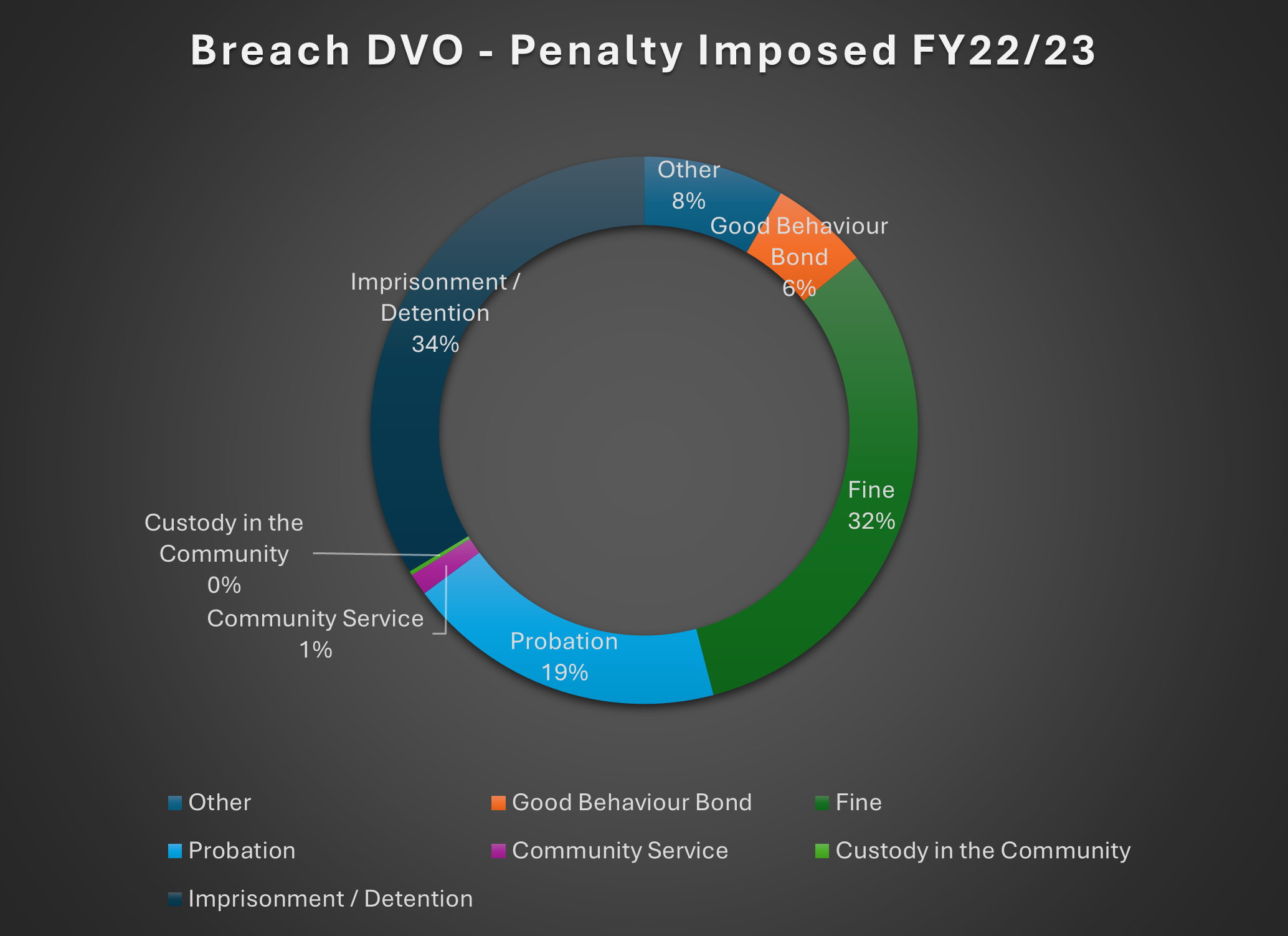
The above graph demonstrates the FY 22/23 sentencing statistics as it relate to Domestic Violence offences, however the data reflects the most serious penalty imposed at the time they are sentenced for their charges.
What can we glean from this graph?
The initial takeaway is that the most common penalty imposed is that of Imprisonment or Detention, this however does not take into account partially or wholly suspended sentences, nor does it take into account objective seriousness of the offending. Let it be clear, the charge of Contravene Domestic Violence Order is a charge the courts take very seriously.
However, the court is required to take each case on its facts and impose a sentence that is just in all the circumstances.
The Court will look at the following factors in determining what penalty to impose:
-
What was the exact nature of the breach, was it serious or was it more of a technical breach
-
Does the defendant have a criminal history and if so for what and how recent was it
-
Was any violence used in the breach
-
Were any children present during the breach
-
What impact did the breach have on the aggrieved?
-
The timing of the breach i.e. how long was the DVO in place before it was breached
-
Was it an early plea of guilty
-
Is the defendant sorry for his or her actions?
-
How old is the defendant?, youthful defendants will often receive a lesser sentence
The court must also take account of the provisions of section 9 of the Penalties and Sentences Act. In summary those are that the purpose of the sentence is to punish the offender to an extent or in a way that is just in all the circumstances, facilitate avenues of rehabilitation, deter the offender and others from committing a similar offence, make it clear that the community denounces the conduct in this offence, and protect the community.
There has, in our experience been an increase in willingness of Courts to sentence offenders to periods of imprisonment for non-violent and persistent breaches of orders.
Conclusion
While it appears statistically that a period of imprisonment, in some form follows as a result of a Breach of Domestic Violence Order offence, these statistics cannot be taken in isolation. A breach of a DVO is a serious charge and viewed so by the Magistrate and the Prosecutor. You do not want to face a court by yourself with this charge. There are serious penalties that can be imposed and the court must also decide whether to record a conviction or not. If a conviction is recorded you could be prevented from travelling overseas or getting certain jobs or work contracts.
We will reiterate - Courts have been cracking down on DVO cases lately and the pressure to apply harsh sentences is only increasing as the community continues to denounce the behaviour.
An experienced criminal defence lawyer will know what mitigating information can be put to Magistrate to in order to reduce the penalty and how to negotiate with the prosecutor where necessary.
How do I get more information or engage you to act for me?
If you want to engage us or just need further free information or advice then you can either;
-
Use our contact form and we will contact you by email or phone at a time that suits you
-
Call us on 1300 952 255 seven days a week, 7am to 7pm
-
Click here to select a time for us to have a free 15 minute telephone conference with you
-
Email the firms founder on This email address is being protected from spambots. You need JavaScript enabled to view it.
-
Send us a message on Facebook Messenger
-
Click the help button at the bottom right and leave us a message
-
Visit our main DVO page for all the information you could ever need
We are a no pressure law firm, we are happy to provide free initial information to assist you. If you want to engage us then great, we will give you a fixed price for our services so you will know with certainty what we will cost. All the money goes into a trust account monitored by the Queensland Law Society and cannot be taken out without your permission or until we are legally allowed to.
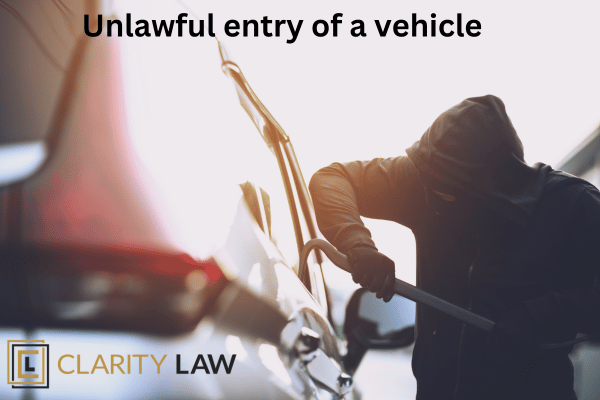
In Queensland there are a number of offences which exist under the umbrella of Burglary and like offences, of those a commonly charged offence is unlawful entry of a vehicle, for committing an indictable offence.
The Law
What does the law say the charge is?
(1) A person who unlawfully enters another person’s vehicle with intent to commit an indictable offence commits a crime.
(2) If—
(a) the offence is committed in the night; or
(b) the offender—
(i) uses or threatens to use actual violence; or
(ii) is or pretends to be armed with a dangerous or offensive weapon, instrument or noxious substance; or
(iii) is in company with 1 or more persons; or
(iv) damages, or threatens or attempts to damage, any property;
What do the police need to prove in order for this offence?
The police need to make out each of the following elements for an offence to have occurred:
A person,
-
Unlawfully enters;
-
Another person’s vehicle;
-
With the intent to commit an indictable offence.
This simply requires the police to prove that the defendant, has entered another person’s car without lawful reason, and that person had the intention to commit further offences.
There are, as shown above circumstances which increase the seriousness of the offending, these are called the circumstances of aggravation. The elements of these as above are straightforward, such as did they occur in the night, was the defendant armed or were they in a group.
Circumstances of aggravation expose a person to a greater maximum penalty than is available for the simpliciter offence.
What does this look like in practice?
James and a group of his friends are wandering around Chermside at 11pm at night. They come across an unlocked car and James’ decides to hotwire the car and go for a joy ride. James has entered the car, has his torso in the footwell and is attempting to start the car. A light inside the house comes on, James runs away into the night.
A CCTV camera has caught the event and James is identified and arrested. James has been charged with the offence for unlawfully entering the vehicle, with the intent to steal the car – being the indictable offence.
Defences
There are defences to the charge, including but not limited to:
- Genuine and honest mistake of fact;
- Lawful entry to the vehicle;
- Ownership of the vehicle;
- No intention of committing an indictable offence; or
- Duress
Penalty
The maximum penalty for this offence is up to 10 years imprisonment or if a circumstance of aggravation is present, up to 14 years.
The circumstances of aggravation are:
- uses or threatens to use actual violence; or
- is or pretends to be armed with a dangerous or offensive weapon, instrument or noxious substance; or
- is in company with 1 or more persons; or
- damages, or threatens or attempts to damage, any property;
The penalty range for the simpliciter offence is varied, ranging from a fine to a period of actual imprisonment. The court considers this to be a serious offence, and even more so where aggravating features are present.
Where will my matter be heard?
The matter will start in the magistrate’s court in the jurisdiction closest to where the offence occurred. The matter will stay in the magistrate’s court, unless violence was threatened or actually used, in which case the matter must be delt with on indictment in the district court.
Will I get a criminal conviction if I plead guilty to the charge?
The answer is possibly. It depends on a number of factors. Only an experienced criminal lawyer can give you advice on the best way to try and avoid a conviction being recorded if you plead guilty to this charge. Note however if imprisonment is part of the penalty then a conviction must be recorded.
Learn more about the difference between a conviction and non-conviction
The police want to talk to me about an offence!
Never ever give an interview to police without first getting legal advice. Even if you are innocent, even if you have a defence you could say the wrong thing and virtually guarantee you will be found guilty of the charge.
The police are not on your side, get immediate legal advice.
Learn more about your right to silence.
I’m not guilty of the offence.
Still don’t talk to the police. A lawyer would require the prosecutor to give them all their evidence and statements. This is known as the full brief of evidence. Once the brief was received then negotiations with the prosecutor to drop the charge can occur.
Learn more about what to do if accused of a crime you didn’t commit.
- I didn’t do it! What to do if Accused of a Crime you didn’t Commit
- Visit our main criminal law website
How do I get more information or engage you to act for me?
If you want to engage us or just need further free information or advice then you can either;
1. Use our contact form and we will contact you by email or phone at a time that suits you
2. Call us on 1300 952 255seven days a week, 7am to 7pm
3. Click hereto select a time for us to have a free 15 minute telephone conference with you
4. Email the firms founder on This email address is being protected from spambots. You need JavaScript enabled to view it.
5. Send us a message on Facebook Messenger
6. Click the help button at the bottom right and leave us a message
We are a no pressure law firm, we are happy to provide free initial information to assist you. If you want to engage us then great, we will give you a fixed price for our services so you will know with certainty what we will cost. All the money goes into a trust account monitored by the Queensland Law Society and cannot be taken out without your permission or until we are legally allowed to.
Observations or Recordings in Breach of Privacy
Written by Steven Brough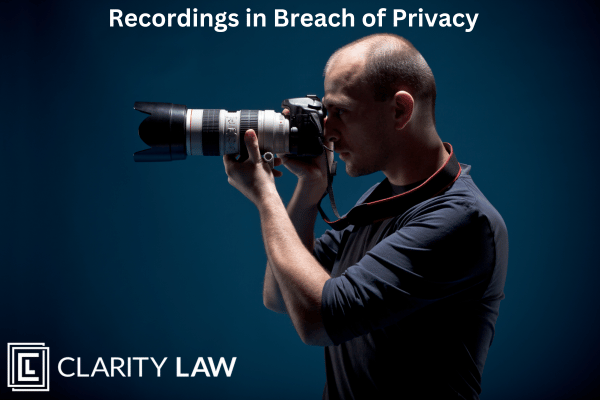
Queensland has instituted various laws to protect individuals' rights and privacy. Section 227A of the Criminal Code addresses the serious offence of making observations or recordings in breach of privacy. This provision aims to safeguard individuals from invasive and unwarranted surveillance, reinforcing the importance of privacy in the digital age.
Understanding Section 227A
Section 227A - Observations or Recordings in Breach of Privacy specifically targets the act of making observations or recordings without consent, infringing upon an individual's right to privacy. The provision encompasses a range of activities, including but not limited to, photographing, filming, or recording someone without their knowledge or consent in situations where they have a reasonable expectation of privacy.
What does the Law say?
Section 227A(1) sest out that:
A person who observes or visually records another person, in circumstances where a reasonable adult would expect to be afforded privacy—
(a) without the other person’s consent; and
(b) when the other person—
(i) is in a private place; or
(ii) is engaging in a private act and the observation or visual recording is made for the purpose of observing or visually recording a private act;
commits a misdemeanour.
In addition a separate offence is set out in section 227A(2)
A person who observes or visually records another person’s genital or anal region, in circumstances where a reasonable adult would expect to be afforded privacy in relation to that region—
(a) without the other person’s consent; and
(b) when the observation or visual recording is made for the purpose of observing or visually recording the other person’s genital or anal region;
commits a misdemeanour.
Elements of the Offence
For a charge under Section 227A to be established, several key elements must be satisfied:
-
Observations or Recordings:
-
The accused must have engaged in the act of making observations or recordings. This can involve visual surveillance, such as taking photographs, as well as audio recordings without the subject's consent.
-
“Observe” is defined as observe by any means.
-
“Visually record a person” means record by any means, moving or still images of the person or part of the subject.
-
-
Lack of Consent:
-
The observations or recordings must have occurred without the explicit consent of the individual being observed or recorded. Consent is a critical factor in determining the legality of such actions.
-
Consent” must be freely and voluntarily given by a person with the cognitive capacity to give the consent.
-
-
Reasonable Expectation of Privacy:
-
The person being observed or recorded must have had a reasonable expectation of privacy in the given circumstances. For instance, activities within private spaces like homes, backyards or washrooms typically carry a higher expectation of privacy than public spaces.
-
It comes down to the test of whether a “reasonable adult” could expect to be afforded privacy in all the circumstances.
-
Where the charge is not related to filming the genital or anal region but just that they filmed the other person then that other person must be in either a private place or engaging in a private act and the observation or visual recording is made for the purpose of observing or visually recording a private act.
-
Examples
Example 1: Beach
Generally, a person at the beach does not expect a high degree of privacy. So a person who films the beach scene as a whole wouldn’t breach the law. However if someone were to specifically film a persons genital or anal region this could be considered a breach of section 227A(2) as this offence does not require the subject to be in a private place.
Example 2: Backyard
Generally, a person in their backyard expects a high degree of privacy. The degree of privacy might be influenced by how many neighbours they have and where the neighbours houses are located. There is however likely not many examples where a person could be filmed in their backyard and this not considered a breach of the law against observations or recordings in breach of privacy.
Example 3: Home
Generally a person in their house expects the very highest degree of privacy. Any filming of someone in their house would breach the law against observations or recordings in breach of privacy.
Which Court will hear the Charge?
The charge of observations or recordings in breach of privacy will be heard in the Magistrates court closet to where the offence occurred.
Penalties
A breach of Section 227A is considered a misdemeanour criminal offence in Queensland. It carries a maximum penalty of up to 3 years in prison.
The severity of the penalties may depend on factors such as
-
the nature of the breach
-
the extent of the invasion of privacy
-
the intention of the accused in doing the filming
-
any potential harm caused to the victim
-
the age of the victim
-
the length of time or the number of times the recording occurred
-
the defendants criminal history
-
how sophisticated the filming setup was
In most cases a prison sentence will be imposed however the defendant may not have to serve time in prison if the sentence is wholly suspended or if an immediate parole release date is set.
Legal Defences
Defendants charged under Section 227A may explore various legal defences, including but not limited to:
-
Lack of Intent:
-
Demonstrating that the observations or recordings were unintentional or accidental may serve as a defence. Proving a lack of malicious intent can be crucial in such cases.
-
-
Consent:
-
If the accused can establish that they had obtained valid consent from the individual being observed or recorded, it could serve as a defence against the charges.
-
-
Public Domain:
-
Arguing that the observations or recordings occurred in a public space where individuals generally have a diminished expectation of privacy may be a viable defence strategy. The law requires that the recordings where done in the situation that that person would expect to be afforded privacy.
-
If the charge was under section 227(1) then proving the filmed person was not a private place or engaging in a private act and the recording was not made for the purpose of observing a private act could be a defence.
-
Can the charge be withdrawn?
Depending on the circumstances it may be possible to negotiate the charge with the prosecutor. This is called case conferencing. For example it might be possible to try and convince the prosecutor that the filing was excused by law or that there was a valid reason for the filming.
Will I get a criminal conviction if I plead guilty to the charge?
The answer is most likely. It depends on a number of factors. Only an experienced criminal lawyer can give you advice on the best way to try and avoid a conviction being recorded if you plead guilty to this charge. Note however if imprisonment is part of the penalty then a conviction must be recorded.
Learn more about the difference between a conviction and non-conviction
The police want to talk to me about a observations or recordings in breach of privacy charge
Never ever give an interview to police without first getting legal advice. Even if you are innocent, even if you have a defence you could say the wrong thing and virtually guarantee you will be found guilty of the charge.
The police are not on your side, get immediate legal advice.
Learn more about your right to silence.
I’m not guilty of observations or recordings in breach of privacy
Still don’t talk to the police. A lawyer would require the prosecutor to give them all their evidence and statements. This is known as the full brief of evidence. Once the brief was received then negotiations with the prosecutor to drop the charge can occur.
Learn more about what to do if accused of a crime you didn’t commit.
How do I get more information or engage you to act for me?
If you want to engage us or just need further free information or advice then you can either;
-
Use our contact form and we will contact you by email or phone at a time that suits you
-
Call us on 1300 952 255seven days a week, 7am to 7pm
-
Click here to select a time for us to have a free 15 minute telephone conference with you
-
Email the firms founder on This email address is being protected from spambots. You need JavaScript enabled to view it.
-
Send us a message on Facebook Messenger
-
Click the help button at the bottom right and leave us a message
We are a no pressure law firm, we are happy to provide free initial information to assist you. If you want to engage us then great, we will give you a fixed price for our services so you will know with certainty what we will cost. All the money goes into a trust account monitored by the Queensland Law Society and cannot be taken out without your permission or until we are legally allowed to.
Conclusion
Section 227A of the Queensland Criminal Code - Observations or Recordings in Breach of Privacy serves as a crucial safeguard for privacy rights in the digital age. Understanding the elements of this offence and potential legal defences is essential for those navigating the complexities of criminal law in Queensland. As technology continues to advance, the legal system must adapt to ensure that individuals' right to privacy is upheld and protected.
How long do criminal convictions stay on my record?
Written by Jacob Pruden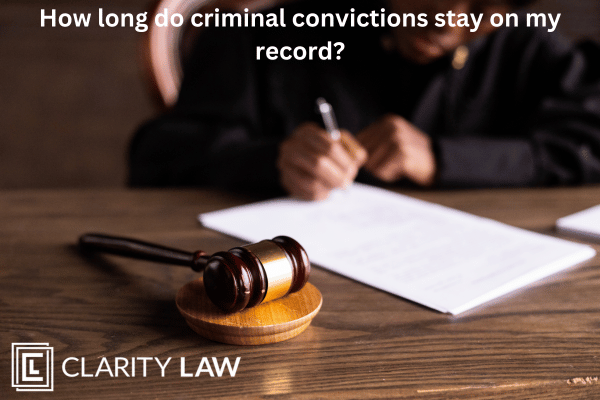
When a court finds someone guilty of an offence that court has a discretion whether to record a conviction or not. In that case, the Court will consider, according to the provisions of section 12 of the Penalties and Sentences Act, whether or not to do so. If the Court does not record the conviction, then it will not appear on a standard police check.
This short article, however, is more concerned with how long a conviction will stay on your record if a conviction is recorded or in other words when is a conviction “spent” in Queensland?
To find that out, we look at the Criminal Law (Rehabilitation of Offenders) Act 1986.
The rehabilitation period
The act refers to a ‘rehabilitation period’, which means a person need not disclose, or agencies (such as police) must not disclose, a previously recorded conviction after a certain period, as explained below.
How long will a criminal conviction in the Magistrates Court last?
The rehabilitation period for a summary offence, that is, an offence dealt with in the Magistrates Court, a conviction will not remain visible on your record 5 years from the date of the conviction. This is so long as no other offences have been committed in the meantime.
How long will a criminal conviction in the District or Supreme Court last?
The rehabilitation period for an indictable offence, that is, an offence dealt with in the District or Supreme Court, a conviction will not remain visible on your record 10 years from the date of the conviction so long as no other offences have been committed in the meantime.
Will the fact I was sentenced to prison affect the time the conviction remains on my record?
Possibly, a conviction will remain on your record forever if you were sentenced to a term of imprisonment for the offence, with time actually served. Otherwise, where you have been sentenced to a term of imprisonment of 30 months or less.
What exceptions to the normal rules exist?
There are multiple other exceptions however with some listed below:
-
A conviction will still appear on your criminal history if relevant for a criminal or civil court proceeding. For example if you go to court for a new criminal charge the court can get access to all your previous convictions.
-
If restitution was ordered then if it has not been paid by the time the rehabilitation period ends the conviction remains until the rehabilitation has been paid in full.
-
It is likely that it would still be required for you to disclose an excluded conviction if you were to apply for Australian citizenship or a blue card.
-
An excluded conviction may still be disclosed if you are seeking admission to a profession, occupation, or calling prescribed by regulation. For example, a lawyer, police officer or corrective services officer.
-
All previous convictions would remain in law enforcement databases.
-
For commonwealth offences where the sentenced occurred in Queensland the rehabilitation period is 10 years no matter which court heard the charge.
In conclusion, the law allows some scope for prior convictions to be hidden from your record.
I had a conviction 15 years ago and I don’t have to disclose it but I’m applying to be a teacher and the form says I must disclosure all convictions
The law specifies where a person must still disclosure a conviction no matter what. They can include:
-
a person applying to be a teacher
-
a person applying to be a lawyer
-
a person applying to be a police officer
-
a person applying for a blue card
You can click here to see the full list.
Can I apply to expunge my conviction early?
No, there is no way to speed up the process and get the conviction removed before the rehabilitation period has ended.
The only rare exception is for people with historical convictions for homosexual offences prior to 1991.
So after the rehabilitation period has ended can I say I was never convicted of an offence?
You can generally say you have no convictions if you meet all the following (see also the exceptions above):
-
you weren't sentenced to imprisonment as part of your sentence or you were sentenced to prison for less than 30 months (regardless of whether you actually had to go to prison)
-
the rehabilitation period (5 years for Magistrates Court convictions, and 10 years for District and Supreme Court convictions or commonwealth convictions) has expired
-
you haven't broken the law since your conviction
-
you have paid any restitution ordered
Remember if no conviction was recorded at the time of the offence then the offence does not appear on your criminal record ever. This article is just about where a conviction was recorded.
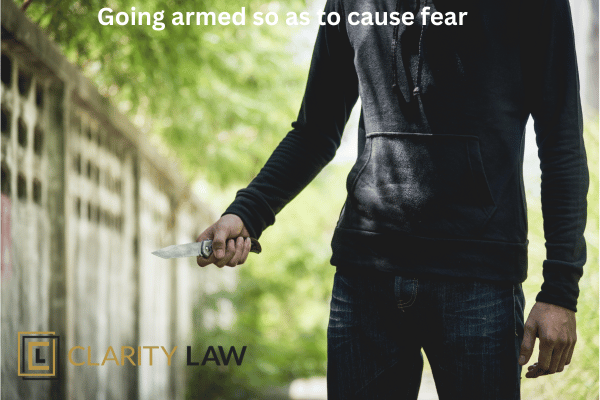
This article is all about the Queensland charge of going armed so as to cause fear charge.
The Law
This offence is contained in section 69 of the Criminal Code. The section states:
“ Any person who goes armed in public without lawful occasion in such a manner as to cause fear to any person is guilty of a misdemeanour, and is liable to imprisonment for 2 years.”
The three key ingredients, then, are that:
-
the defendant was in public,
-
openly armed,
-
in a manner likely to cause fear.
In practical terms, the circumstances are important. A person holding a cricket bat in his yard playing a game with his kids is very different from the same man holding a cricket bat in a neighbour’s driveway, calling the neighbour out for a confrontation.
Lawful occasion
It may be noticed in subsection (1) that the person must go armed in public “without lawful occasion”. A person might readily contemplate a “lawful occasion” to be an armed police officer or security guard. For a private citizen there might be lawful occasions to be armed. It is unlikely for self-protection or self-defence to be such an occasion when there is no clear and present threat to the defendant.
One case that considered this question of “lawful occasion” was one where a man, who was on his own property, shot his rifle into the air to break up a fight. One of the judges in the case commented:
Other lawful reasons or excuses for going, at least temporarily, armed in public on the outskirts of towns in western Queensland can readily be imagined. Using a rifle to shoot a rabid dog or a wild pig that presents a threat to the safety of people in the area would surely not under s. 69(1) be “without lawful occasion” simply because it takes place in public and causes fear. Here it was not dogs or pigs that Mr Bennett was seeking to restrain, but his own sons, who were engaged in a serious attack on another person. Firing a shot harmlessly in the air in order to bring them to their senses was not only a legitimate reason or lawful excuse for his going armed in public (if that is what he did) but a thoroughly effective one. On hearing the shot fired, Lindsay decided to “cut it out”, as he said, and leave his victim go. Both he and George stopped hitting Barry Facer and returned to the house.
Defences to the charge of going armed so as to cause fear
-
The defendant was not the person who committed the offence
-
The defendant was not in public
-
The defendant was not “armed”
-
The defendant did not act in a manner to cause fear
-
The defendant had a lawful occasion to be armed
Penalty
The maximum penalty is up to 2 years imprisonment.
Penalties can vary widely for this offence. In one case, a man was sentenced to a term of actual imprisonment for pointing a handgun at someone and pulling back the top slide. Though he didn’t shoot the weapon, the court found his actions to be so serious to be deserving of imprisonment. In another case, a man was brandishing a knife in a threatening way. He was also sentenced to imprisonment. Fines or penalties less than imprisonment are also available for this offence. Nevertheless, the courts consider this to be a serious charge and we highly recommend you seek legal advice if you are charged with such an offence.
Which court hears the charge of going armed so as to cause fear
The Magistrates Court closet to where the alleged offence occurred will hear the charge.
Can the charge be withdrawn?
Depending on the circumstances it may be possible to negotiate the charge with the prosecutor. This is called case conferencing. For example it might be possible to try and convince the prosecutor that the wounding was excused by law or the medical evidence does not meet the standard for a wounding charge and therefore the charge should be withdrawn.
Will I get a criminal conviction if I plead guilty to the charge?
The answer is possibly. It depends on a number of factors. Only an experienced criminal lawyer can give you advice on the best way to try and avoid a conviction being recorded if you plead guilty to this charge. Note however if imprisonment is part of the penalty then a conviction must be recorded.
Learn more about the difference between a conviction and non-conviction
The police want to talk to me about a going armed so as to cause fear charge
Never ever give an interview to police without first getting legal advice. Even if you are innocent, even if you have a defence you could say the wrong thing and virtually guarantee you will be found guilty of the charge.
The police are not on your side, get immediate legal advice.
Learn more about your right to silence.
I’m not guilty of the going armed so as to cause fear
Still don’t talk to the police. A lawyer would require the prosecutor to give them all their evidence and statements. This is known as the full brief of evidence. Once the brief was received then negotiations with the prosecutor to drop the charge can occur.
Learn more about what to do if accused of a crime you didn’t commit.
How do I get more information or engage you to act for me?
If you want to engage us or just need further free information or advice then you can either;
-
Use our contact form and we will contact you by email or phone at a time that suits you
-
Call us on 1300 952 255seven days a week, 7am to 7pm
-
Click hereto select a time for us to have a free 15 minute telephone conference with you
-
Email the firms founder on This email address is being protected from spambots. You need JavaScript enabled to view it.
-
Send us a message onFacebook Messenger
-
Click the help button at the bottom right and leave us a message
We are a no pressure law firm, we are happy to provide free initial information to assist you. If you want to engage us then great, we will give you a fixed price for our services so you will know with certainty what we will cost. All the money goes into a trust account monitored by the Queensland Law Society and cannot be taken out without your permission or until we are legally allowed to.

We will be closed for the Christmas break from 12pm on 22 December until 8:30am on 8 January 2024.
Over the Christmas break you can leave a telephone message and from 2 January, until we reopen, we will be checking the messages and responding once per day. We do have availability to represent clients in January.
Alternatively if you would like to book a free telephone conference for when we fully reopen on 8 January you can click this link www.calendly.com/clarity_law
We'd like to thank everyone who supported the firm this year and wish everyone a safe and happy festive season.





